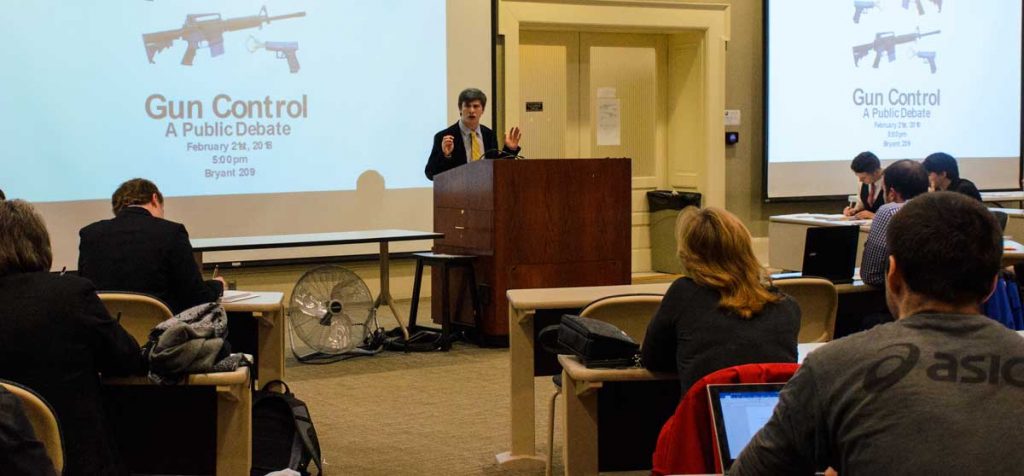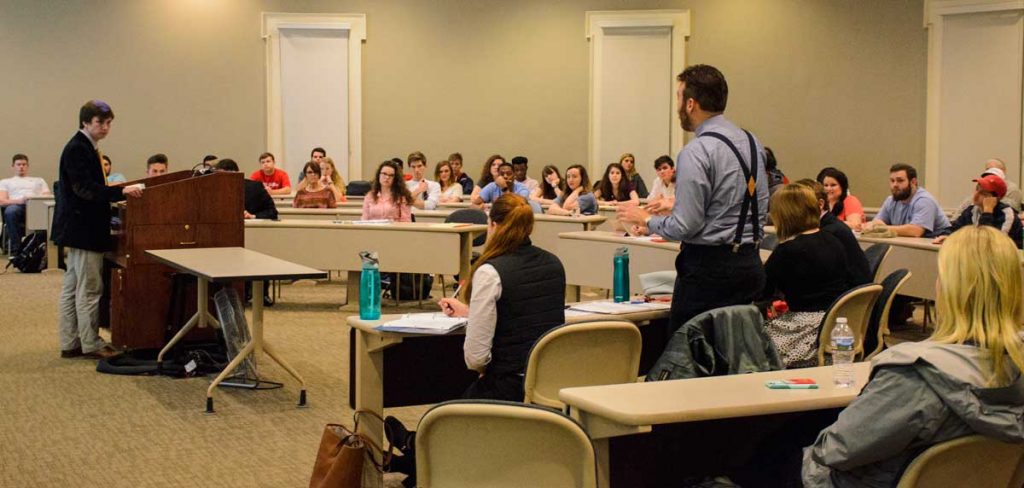The debate team’s eight members put themselves in the shoes of the Mississippi Senate as they argued different sides of gun control last night in Bryant Hall.
More than 50 community members watched teams debate the statement, “This House, as the Mississippi Senate, would not pass House Bill 1083.”
House Bill 1083 passed the House on Feb. 7 and currently sits in the Senate. If the Senate passes the bill, it will “authorize any person who has an enhanced firearms license to carry such firearm on public property,” including college campuses.

Debate team member Jack Fitzpatrick speaks on gun control and the Mississippi House Bill 1083 during the public debate in Bryant Hall Wednesday. Photo by Marlee Crawford
Members of the debate team knew the topic would be gun control but were not aware that they would be discussing the Mississippi bill specifically. They were given 10 minutes before the debate began to prepare their points.
The debate was formatted in a mock British parliamentary style. The debaters split into four teams of two people each. They were given five minutes to speak and alternate between the for and against sides. Students were allowed to speak for five minutes during which they could take questions from the opposing side before a signal was given that they must address questions from the opposing side if there are any.
Members of the debate team do not choose which side they represent, so they are sometimes tasked with arguing against the side they personally believe in.
The two groups arguing against passing the bill argued some of the following points: Guns are used in 67 percent of homicides in the U.S., the only mass shooting that has been stopped by an enhanced carry permit holder was in 2004 and that was an ex-police officer and that you can never know anyone’s real intentions regardless of how much training he or she may have.
Freshman international studies major Olivia Kemp was on the first team against passing the bill. She brought up a point specifically related to Ole Miss football during her turn at the mic.
“(Guns) are not needed for protection in areas that are protected,” Kemp said. “In our football stadium, we have clear bag checks, we have security presence, we have pat downs and we also have an undeniable presence of alcohol. Guns and alcohol do not mix.”
The two groups arguing for passing the bill responded with a few of the following points: Having armed individuals with enhanced carry permits in schools alone will deter a potential shooter; police response times in rural areas are too slow, so people need to be armed; and voting down the bill will not stop criminals from obtaining and using guns.
Senior public policy leadership and political science double major Tristan Young was on one of the teams arguing for the passing. He compared banning guns to drug epidemics that get out of hand because the drugs aren’t regulated.
“When we’ve seen this in the past, whenever we create legislation that says, ‘No, you can’t have a certain thing,’ what happens?” Young asked. “Sure, the law-abiding citizens can’t have it. What about those who aren’t law abiding, who would shoot up a school?”
Young stressed the fact that protecting society starts with the ability of people to protect themselves and others around them.
“The firearm is indeed dangerous, but this bill doesn’t change that,” Young said. “If you pass it, if you take it away, if you ban AR-15s, none of this changes. Only by passing it do we have change with the source of the problem and/or solution – the people.”
One of the most applauded points of the night was made by senior criminal justice major Sydney Marie Heart just as she took the stand to speak.
Heart held up a card and said, “This is my firearms permit. This is my enhanced carry permit.”
She described the simple process of walking into the state trooper’s station in Batesville, filling out paperwork, having her fingerprints taken and showing her military enrollment certification to get her permit.
“I could be carrying a gun right now legally, and it’s against university policy, which is what this legislation actually aims to change, but the fact of the matter is I didn’t have to qualify according to Mississippi with any firearms,” Heart said. “In the three years that I’ve had this, I have not fired a weapon. For three years, I haven’t touched a gun, and I’m allowed to carry one on campus for your protection.”
Throughout the evening, audible knocks of agreement could be heard on tables around the room while the debaters spoke.
“This is a mock British parliamentary debate, and that is how they signify, rather than applauding,” JoAnn Edwards, director of the debate team, said. “You can rap the table once or twice to connote ‘I am in favor. I’m against or congratulations.’”

Debate team member Jack Fitzpatrick answers a question while arguing his point on gun control and the Mississippi House Bill 1083 during the public debate in Bryant Hall Wednesday. Photo by Marlee Crawford
In the British parliamentary style of debate, the four groups are ranked from one to four rather than determining definite winners and losers. After all four groups were finished speaking, they left the room to allow the audience to vote to determine their rankings and have an open discussion before allowing the debaters back into the room to reveal the results.
In the end, the closing team arguing against passing the bill was ranked first – it was a close vote of 27-25. The closing team arguing for passing the bill and the opening team for passing the bill were ranked second and third, respectively, and the opening team against passing the bill was ranked fourth.
Edwards chose the topic of gun control because she said it is such a relevant topic now in Mississippi and at the university.
“When the university administration voices concern and the chairman of the SEC voices a concern and there is still something to be debated about it out there, I just felt that it needed to be heard by a broader audience than at our debate practice,” Edwards said.
Sophomore political science major Zach Wheeler said he thought both sides brought up good points and defended their sides well.
“I had a strong opinion on gun control at the time, and I really believe it’s necessary to have some sort of gun control in place in society,” Wheeler said. “Now, to the extent of which, I’m not sure, but I think a lot of which each side did was reaffirm my opinions already coming into the debate, which was really interesting.”
Junior history major George Dedes said it was good to hear dialogue from both sides of the debate, even though they may not agree.
“I’m pro-guns and pro-open carry or concealed carry,” Dedes said. “I think (there were) some valid points from the other side for gun control, but they didn’t really sway me to their side.”
Edwards said this public debate was about continuing a dialogue.
“Conversation is so important about issues that affect all of us,” Edwards said. “That’s why I love this style of debate because, hopefully, it starts a conversation.”






